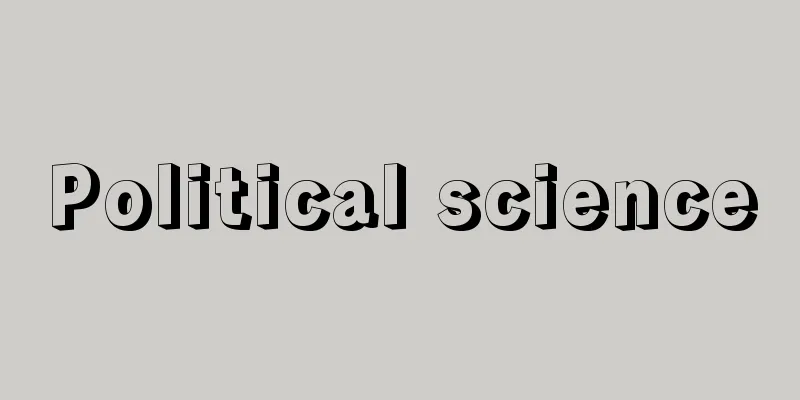Political science

|
In Western Europe, political science has been known by this name since the days of ancient Greece and Rome, and is one of the oldest academic fields. The etymology of the word "polis" in Western Europe comes from the ancient Greek city-state, the polis. In other words, it developed as an academic field that focused on public life in the polis. Aristotle called it the "queen of the sciences." However, as an academic field with such a long history, its academic character and methods are extremely diverse, and its establishment as an academic field in the strict sense is relatively recent. This is why political science is said to be both the oldest and the newest academic field. Aristotle of ancient times is called the founder of political science, and Machiavelli of the early modern period is called the father of modern political science because their political research empirically and empirically examined and analyzed the reality of politics, formulated certain laws and theorized them, and constructed a theoretical framework for comparison. Of course, they also considered ideas in politics and pursued ideals, but it cannot be denied that they had a great influence on the establishment of political science as an empirical science. [Masayuki Fukuoka] The concept of political scienceBecause political science has the historical background described above, the concept of political science is used in various ways, both broadly and narrowly. In the broadest sense, political science refers to all theoretical, historical, ideological, philosophical, and scientific research and consideration related to politics, and there is no distinction between philosophy and science, or between history, theory, and policy. However, when political science is used in a narrower sense, it refers to empirical and empirical research on politics, and excludes religious, philosophical, and ethical considerations on politics, such as the essence and purpose of politics and the state, ideals and values that should be realized, or research on politics from a certain worldview, ideology, metaphysics, etc. In other words, it is used exclusively to refer to political science as an empirical science or a behavioral science based on more recent rigorous methodology. And even within this narrow sense of politics, traditional "political science" has recently been criticized for not being methodologically rigorous as an empirical science or social science, and for being insufficiently empirical, and the term "political analysis" is used to distinguish it from that. In addition, in contrast to the traditional "traditional political science" that emphasized legal and institutional aspects, it is sometimes called "behavioral political science" or "modern political science" as it places emphasis on the analysis of political behavior and processes. It was in the second half of the 19th century that political science began to be established as an independent academic field at universities, and until then it was part of law (in Germany) or history (in the United States). It was after World War II that political science began to be studied actively, and today research is being conducted in a variety of fields, including "political science," "history of political science (history of political thought)," "comparative politics," "political sociology," "theory of political consciousness (behavior)," and "international politics." [Masayuki Fukuoka] Japanese PoliticsWith this history of political science, Japanese political science was strongly influenced by German state studies and public law studies before the war, and inevitably, many studies were centered on the concepts of the state or constitution. However, with Kihei Onozuka becoming independent of state studies, Sakuzo Yoshino advocating his own theory of democracy, and Ikuo Oyama studying political science from a sociological perspective and attempting to establish "social laws," political science gradually began to show signs of transforming into "political science as a science." Therefore, while it can be said that political science's independence as a social science was secured, political science inevitably came to be bound by the constraints of the era of the Emperor System, since it had to touch on the state or the national polity (especially the fascist elements of that time). When World War II ended and freedom was brought to every corner and every aspect of Japan, both political society and political science were freed from long-standing constraints and embarked on a new start. After the war, Japanese political science was strongly influenced by American behavioral, systems, and functional research, but it also aimed to promote research that was unique to Japan. Gradually, unique research was attempted in each field of political science, and research on political attitudes and voting behavior has grown to a considerable extent to the point where empirical data can be collected and used. As a result, many surveys were conducted using American research methods, with the political reality of Japan as the research subject. [Masayuki Fukuoka] The integrative role of political sciencePolitical science, once given the status of a master science (integrated science), is now subject to fierce encroachment from adjacent sciences in terms of research area. Political science is positioned as a field of social science along with economics, law, business administration, sociology, psychology, etc. In order to play an integrated role, it has the mission of bringing together all academic disciplines and enabling accurate prediction of social reality and value orientation. Masao Maruyama described a researcher of political science as "someone who knows something about everything and knows everything about something," and defined him as someone like an orchestra conductor. In other words, he has both dilettantism, knowledge of all the instruments in the orchestra, and professionalism, complete knowledge of conducting techniques. Political science researchers are naturally inclined to engage in interdisciplinary collaborative research because political science is essentially the art of governance, and in order to do so, all information is analyzed and judged. On the other hand, a multifaceted approach is absolutely necessary to deal with complex and diverse social phenomena. For this reason, political science, which studies "power" with its most complex mechanisms and functions, must attempt to utilize a wide range of knowledge and conduct collaborative research with various adjacent sciences. It is said that only when interdisciplinary research in political science progresses will political science be able to establish its academic position in the social sciences and demonstrate its existence. [Masayuki Fukuoka] Political Science GenreSo, what are the courses in political science offered at universities today? Standard courses are divided into the following ten genres. (1) State theory This field is an old-style research field influenced by German state studies and public law studies, but even today, it is a theme that studies the state as a whole in the form of modern state theory, administrative state theory, and welfare state theory. However, considering that political system theory has become the mainstream of research in recent years, it is becoming important to take an approach that views the state in a pluralistic rather than unitary way. (2) Political Institutional Theory Political institution theory is influenced by constitutional law studies, and is a traditional political approach that limits the main research subject to political institutions such as parliaments and political parties in the form of comparative political mechanism theory or political institution theory. (3) Political Process Theory Today, as political science research is strongly influenced by system theory, the course on political process theory has become a major research field in political science. Its main focus is on how various agents in the so-called political process, such as political parties, pressure groups, elections, the mass media, and bureaucracy, fulfill their political mechanisms. Among these, political party theory is an important research area because modern politics is based on party politics, pressure groups complement political parties, and election theory and mass media theory are also important themes in parliamentary democracy. Furthermore, research on bureaucracy has been an essential field in political science since the research of Max Weber, and is now considered important in areas such as policy decision-making. (4) Public Administration Since the world today is in an administrative state situation, public administration is an important research area, and together with local administration, autonomous administration, and local autonomy theory, it occupies a major part of political science. (5) International Politics Political science raises many questions not only about domestic issues but also about international relations. For this reason, international relations, such as diplomatic history, international politics, and collective security, are a field of political science. (6) Behavioral Politics This field is a new field within political science, and has course names such as political sociology, political psychology, political consciousness, political culture, and leadership. It is a method of political analysis centered on human behavior, and these courses have become quite important in recent years. (7) Political Theory Theoretical research on politics is related to all fields, but it is an important field, as typified by democratic theory. Recently, various theories such as political change theory, political development theory, elite theory, and decision-making theory have been developed, and it is treated as a major course in political science. It is not merely a historical or doctrinal study, but is an extremely diverse field in relation to the research subjects. (8) Quantitative Politics This is the newest research field in political science, and it elucidates politics quantitatively or quantitatively, and is the most typical type of scientification of politics. (9) Comparative Politics In the field of political science, the field of comparative politics occupies a very large weight in the United States and other countries, and courses on comparative politics are also common in Japan. Currently, because political science is based on historical and regional comparisons, and because the world political situation has a major impact on domestic politics, the field of comparative politics has recently become increasingly important. (10) Political Philosophy This field, like state theory, is an old approach that includes political thought, political philosophy, and the history of political theory. As described above, political science is divided into various genres, all of which are mutually complementary, and there is a progress in specialization of specific areas and collaboration with other fields. [Masayuki Fukuoka] Factual analysis and value judgmentsThus, research in political science can be broadly divided into two categories: scientific and philosophical. On the one hand, there are descriptive theories that arise from fact-based positivism, and on the other hand, there are normative theories that arise from value-centered idealism. In between these two, there are prescriptive theories. However, in reality, the two theories coexist, and there are many highly arbitrary and speculative theories, with policy studies also existing somewhere in between. This issue of factual analysis and value judgment in political science is an old problem in political science. Especially now, after the "behavioral science revolution," political science has adopted mathematical methods such as game theory, model research, and simulation, and statistical methods are used in voting behavior and political consciousness theory, leading to the widespread use of quantitative analysis, making the issue of value judgment in political science research important. [Masayuki Fukuoka] Current Issues in Political ScienceTherefore, it is said that political science today is at a major turning point in its methodology. However, it cannot be denied that methods that sharply illuminate the dynamic process of politics are being adopted, and that there is a growing tendency to analyze politics systematically and dynamically. Ideological approaches, institutional approaches, and philosophical and speculative approaches are all becoming less prominent, and scientific political science that grasps political phenomena empirically is becoming mainstream. Furthermore, as the use of computers in political analysis spreads, there is a tendency once again to lose the philosophical perspective of political orientation. For this reason, there is a call for political science to try every possible approach to the political issues of the day, without needlessly agonizing over methodology, and to consider solutions based on the premise of clarifying the facts. In other words, the challenge facing political science today is how to elucidate the political issues of the time and create solutions to them. Either way, the question is how political science today, not just in Japan, can become independent as a field of social science. [Masayuki Fukuoka] "Political Systems, 2nd Edition, by D. Easton, translated by Takeshi Yamakawa (1976, Pelican Publishing)" ▽ "Workbook on Political Science, edited by Yoshiaki Iizaka and Tan Horie (1979, Yuhikaku)" ▽ "Political Science, by Yoshiaki Iizaka (1975, Gakuyo Shobo)" ▽ "David Easton A Systems Analysis of Political Life (1965, New York)" [Reference items] | | |Source: Shogakukan Encyclopedia Nipponica About Encyclopedia Nipponica Information | Legend |
|
政治学は、西欧においては、古代ギリシア・ローマの時代から、この名称で知られた、もっとも古い学問の分野の一つであった。政治学の西欧における語源は古代ギリシアの都市国家であるポリスに由来する。つまりそれはポリスにおける公共生活を対象とする学問として発達した。アリストテレスはこれを「諸学の女王」とよんでいる。けれども、古い歴史をもつ学問であるだけに、その学問的性格や方法はきわめて雑多であり、厳密な意味での学問としての確立は比較的最近のことに属する。政治学がもっとも古くてまた新しい学問だといわれるゆえんがここにある。 古代のアリストテレスが政治学の始祖とよばれ、そして近代初期のマキャベッリが近代政治学の父といわれるのは、彼らの政治研究が、政治の現実を実証的、経験的に考察し、分析し、一定の法則化、理論化を行い、また比較するための理論的枠組みを構築したからにほかならない。もちろん彼らにおいても政治における理念の考察や理想の追求などがみられないではないが、彼らが経験科学としての政治学の樹立に大きな影響を及ぼしたことは否定できない。 [福岡政行] 政治学という概念政治学は以上のような歴史的背景をもっているので、政治学という概念は、広義、狭義にわたり、さまざまな意味に用いられている。もっとも広い意味では、政治学は、およそ政治に関するいっさいの理論的、歴史的、思想的、哲学的、科学的研究や考察をさし、とくに哲学と科学の区別や、歴史・理論・政策の区別などもなされない。 しかし政治学をより狭義に用いる場合には、政治に関する実証的、経験的な研究をさし、政治に関する宗教的、哲学的、倫理的考察、つまり政治や国家の本質や目的、実現すべき理念や価値などの考察、あるいは一定の世界観やイデオロギー、形而上(けいじじょう)学などの立場からする政治の研究などは除外される。つまり経験科学あるいは最近のより厳格な方法論に基づく行動科学としての政治学に限定して用いられる。そして、こうした狭義における政治学=政治科学のなかでも、最近は、従来の「政治学」が経験科学あるいは社会科学としてかならずしも方法論的には厳格ではなく、また実証性において不十分であったという批判が加えられ、それと区別する意味で「政治分析」political analysisという表現が用いられる。また従来の法的、制度的側面を重視した「伝統的政治学」に対して、政治における行動や過程の分析に重点を置くものとして「行動論的政治学」とか「現代政治学」という呼び方がなされることもある。 政治学が独立した学問として大学に設置されるようになったのは19世紀後半であり、それまでは法学の一部(ドイツ)、あるいは歴史研究の一部(アメリカ)をなしていた。政治学が盛んに研究されるようになったのは第二次世界大戦以降であり、今日では、「政治学」「政治学史(政治思想史)」「比較政治」「政治社会学」「政治意識(行動)論」「国際政治」などさまざまな諸分野に分かれて研究が進められている。 [福岡政行] 日本の政治学このような政治学の歴史の下で、日本の政治学は、戦前においてはドイツ国家学・公法学の影響が強く、必然的に、国家あるいは憲法という概念を中心とした研究が多くみられた。しかし、小野塚喜平次(きへいじ)により政治学が国家学から独立し、吉野作造が独自のデモクラシー論を主唱し、大山郁夫(いくお)によって社会学的に政治学が研究され、「社会法則」の樹立が試みられるなかで、政治学がしだいに「科学としての政治学」への転化を示し始めていたのである。それゆえ、政治学の一社会科学としての自立は確保されたと考えられる反面、政治学が国家あるいは国体(とくにこの当時のファシズム的なもの)に触れざるをえないため、どうしても天皇制という時代的制約が課せられてしまうことにもなったのである。 第二次大戦が終わって、日本のあらゆるところに、そしてあらゆる面に自由がもたらされたとき、政治社会もそして政治学も長い間の拘束から解放され、新しい出発へと踏み出した。戦後日本の政治学は、アメリカの行動論的、システム論的、機能論的研究の影響を強く受けながらも、日本独自の研究を推進することを目ざした。政治学の各分野でもしだいにユニークな研究が試みられ、政治意識、投票行動の研究などもかなりの程度、実証的なデータを収集し、利用可能な状態にまで成長してきた。この結果、日本という政治的現実を研究対象とし、アメリカの研究方法を利用した調査なども数多く行われた。 [福岡政行] 政治学の統合的役割かつて、マスター・サイエンスmaster science(統合科学)の地位を与えられていた政治学は、現在、隣接諸科学からの激しい研究領域上の侵犯を受けている。政治学は経済学、法学、経営学、社会学、心理学などとともに社会科学の一分野として位置している。そして、統合的役割を果たすために、あらゆる学問をまとめて、社会的現実の的確な予測と価値方向定位を可能にしなければならないという使命を内包している。丸山真男(まさお)は政治学の研究者を評して「あらゆることについて何事かを知っており、何事かについてあらゆることを知っている人」と述べ、それはオーケストラの指揮者のような人であると規定する。つまり、オーケストラのあらゆる楽器についての知識dilettantismと指揮法についての完全な知識professionalismの双方を身につけていることである。政治学の研究者には、政治学が本来統治の術であり、そのためにあらゆる情報を分析して判断するものであるから、必然的に学際的な協同研究の姿勢がみられるのである。一方、複雑・多岐化している社会現象に対しては、どうしても複眼的なアプローチが必要である。そのためにも、もっとも複雑な機構と機能を有する「権力」を研究対象とする政治学が広い知識の利用を試みて、いろいろな隣接科学との協同研究を行うことが必要となる。政治学の学際的研究が進むとき初めて、政治学の社会科学における学問的位置が確定し、その存在が示されるといわれる。 [福岡政行] 政治学のジャンルそれでは、今日、政治学の大学における講座はどのようになっているのか。標準的な講座は次の10ジャンルである。(1)国家論 この領域は、ドイツ国家学や公法学の影響を受けて、古いタイプの研究領域であるが、現在においても、現代国家論、行政国家論、福祉国家論というような形で、国家全体を研究するテーマでもある。しかしながら、最近では、政治体系論が研究の主流になっていることを考えると、国家を一元的にとらえるのではなく多元的にとらえるアプローチが重要になってきている。(2)政治制度論 政治制度論は、憲法学の影響を受けており、比較政治機構論あるいは政治制度論というような形で主要な研究対象を議会や政党など政治制度に限定したものであり、伝統的な政治アプローチである。(3)政治過程論 今日において政治学の研究がシステム理論の影響を強く受けるなかで、政治過程論という講座が政治学の主要な研究領域になってきた。これは、政党、圧力団体、選挙、マスコミ、官僚制など、いわゆる政治過程のなかのさまざまのエージェントがどのようにして政治的なメカニズムを果たしていくのかということを中心的対象としているのである。政党論は、そのなかでも現代政治が政党政治をその基底に置いていることから重要な研究領域となっているし、圧力団体は政党を補足する形で、また議会デモクラシーのなかで選挙論、マスコミ論なども重要なテーマとなっている。さらに、官僚制の研究は、マックス・ウェーバーの研究以後、政治学においても不可欠の分野であり、今日では、政策決定などの分野においても重要視されている。(4)行政学 今日的世界が行政国家的な状況を呈しているということから、行政学は重要な研究領域であり、地方行政、自治行政、地方自治論などとあわせて、政治学の主要な一画を占めている。(5)国際政治論 政治学は、内政的な問題のみならず国際関係の分野についても多くの問題を提起している。そのために、外交史あるいは国際政治論、集団安全保障論など、国際関係論が政治学の一分野となっている。(6)行動科学的政治学 この分野は、政治学のなかでも新しい分野として、政治社会学、政治心理学、政治意識論、政治文化論あるいはまたリーダーシップ論等々の講座名となっており、人間の行動を中心に政治分析を行う手法であって、最近ではこれらの講座がかなり重要なものとなっている。(7)政治理論 政治についての理論研究は、すべての領域と関連するが、民主主義理論などに代表されるように、重要な分野である。最近では、政治変動論や政治発展論、あるいはエリート理論や意思決定論など、さまざまな理論が展開されるようになり、政治学の主要な講座として扱われている。また、単に歴史的、学説史的な研究にとどまるものではなく、研究対象との関係できわめて多彩な領域である。(8)計量政治学 政治学の研究領域のなかではもっとも新しいものであり、政治を計量的あるいは数量的に解明するもので、政治の科学化のもっとも典型的なタイプである。(9)比較政治 政治学の研究領域のなかでアメリカなどでは、比較政治の分野がきわめて大きなウェイトを占めており、日本においても比較政治学の講座は一般的となっている。現在においては、政治学は歴史的、地域的な比較がその根底にあることから、また、世界の政治状況が国内の政治に大きく影響することから、この比較政治という分野は最近ますます重要視されている。(10)政治哲学 この分野は、国家論と並び古いアプローチである政治思想、政治哲学、政治理論史等々の分野である。 以上のように、政治学は、さまざまのジャンルに分かれているが、それらはすべて相互補完的であり、固有の領域の専門化と、他の領域との協同化が進んでいる。 [福岡政行] 事実分析と価値判断このように、政治学の研究は科学的なものと哲学的なものの二つに大別される。一方は、事実に基づいた実証主義Positivismから生じる「記述的」descriptiveな理論であり、他方は、価値を中心とした理想主義Idealismから生じる「規範的」normativeな理論である。そして、この両者の中間に「規定的」prescriptiveな理論が生じるのである。しかし、実際は先の二理論が混在して、きわめて恣意(しい)的で思弁的な理論が多くみられることもあり、中間に政策学も成立する。 この政治学における事実分析と価値判断の問題は政治学における古くからの問題である。そして、とくに現在、「行動科学革命」が生じたあと、政治学においてもゲーム理論、モデル研究、シミュレーションなどの数学的手法が取り入れられ、投票行動、政治意識論などにおいて統計的手法が用いられ数量分析が多くみられることによって、政治学研究における価値判断の問題が重要となってきている。 [福岡政行] 政治学の今日的課題それゆえ今日、政治学はその方法論において大きな曲り角にたっているといわれる。しかしながら、政治のダイナミックな過程を鋭く照射する手法がとられ、政治を体系的、動態的に分析する傾向が高まっていることは否定できない。イデオロギー的なアプローチも、制度的なアプローチも、哲学的で思弁的なアプローチも、それぞれの存在は薄くなってきており、政治現象を実証的にとらえる科学的政治学が主流となっている。 また、コンピュータの政治分析での利用が広まるなかで、ふたたび政治的方向定位という哲学的視点が欠落する傾向もある。それゆえ政治学は、むやみに方法論に苦悶(くもん)することなく、時の政治的課題に対して、あらゆるアプローチを試みることによって、事実解明を前提とし、そのうえで解決方法を思索する必要が叫ばれている。つまり政治学の今日的課題は、時代の政治的課題をいかに解明し、その解決策をつくりだすかにあるといえよう。いずれにせよ、日本の政治学のみならず、今日の政治学は、社会科学の一分野として、いかにして自立してゆくかが問われているのである。 [福岡政行] 『D・イーストン著、山川雄巳訳『政治体系』第二版(1976・ぺりかん社)』▽『飯坂良明・堀江湛編『ワークブック政治学』(1979・有斐閣)』▽『飯坂良明著『政治学』(1975・学陽書房)』▽『David EastonA Systems Analysis of Political Life (1965, New York)』 [参照項目] | | |出典 小学館 日本大百科全書(ニッポニカ)日本大百科全書(ニッポニカ)について 情報 | 凡例 |
Recommend
Emerging from the heavens - Ukatosen
(To move to the mountains and become a hermit) To ...
Aster amellus (English spelling) Asteramellus
… [Munemin Yanagi]. … *Some of the terminology th...
Psychogenie
... is a psychiatric term referring to mental dis...
Aobana - Aobana
→Dayflower Source: Shogakukan Encyclopedia Nippon...
Main line section - Main line section
These are lines that JNR (now JR) believed could o...
Early modern documents - Kinsei Monjo
… Among non-political documents, (D) petition doc...
Genus Okichimozuku
...This species is distinguished by its long assi...
Jianghu - Kouko
〘 noun 〙 (formerly also called "gouko") ...
Sheng Mao (English spelling)
A professional painter in the Yuan Dynasty, China,...
Kim Chongjik (English name)
[Born] Sejong 13 (1431) [Died] Seongjong 23 (1492)...
English Revolution
This revolution, which in the narrow sense refers ...
Fire Tree
The light of many lamps. (Book of Southern Qi, Boo...
Pets - Pets
Pets are animals kept to enrich people's live...
Gaeta (English spelling)
Ancient name: Gaieta. A port city and naval port i...
Budd-Chiari syndrome
British physician G. Budd (1808-1882) and Austrian...









